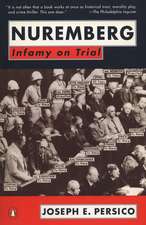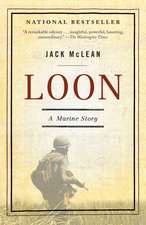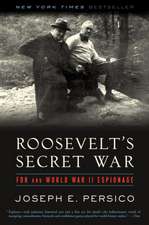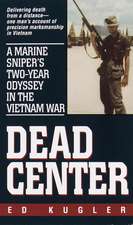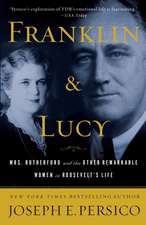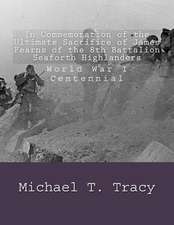My American Journey
Autor Colin Powell, Joseph Persicoen Limba Engleză Paperback – 28 feb 2003
--The New York Times Book Review
Colin Powell is the embodiment of the American dream. He was born in Harlem to immigrant parents from Jamaica. He knew the rough life of the streets. He overcame a barely average start at school. Then he joined the Army. The rest is history--Vietnam, the Pentagon, Panama, Desert Storm--but a history that until now has been known only on the surface. Here, for the first time, Colin Powell himself tells us how it happened, in a memoir distinguished by a heartfelt love of country and family, warm good humor, and a soldier's directness.
MY AMERICAN JOURNEY is the powerful story of a life well lived and well told. It is also a view from the mountaintop of the political landscape of America. At a time when Americans feel disenchanted with their leaders, General Powell's passionate views on family, personal responsibility, and, in his own words, "the greatness of America and the opportunities it offers" inspire hope and present a blueprint for the future. An utterly absorbing account, it is history with a vision.
"The stirring, only-in-America story of one determined man's journey from the South Bronx to directing the mightiest of military forces . . . Fascinating."--The Washington Post Book World
"Eloquent."
--Los Angeles Times Book Review
"PROFOUND AND MOVING . . . . Must reading for anyone who wants to reaffirm his faith in the promise of America."
--Jack Kemp
The Wall Street Journal
"A book that is much like its subject--articulate, confident, impressive, but unpretentious and witty. . . . Whether you are a political junkie, a military buff, or just interested in a good story, MY AMERICAN JOURNEY is a book well worth reading."
--San Diego Union Tribune
"Colin Powell's candid, introspective autobiography is a joy for all with an appetite for well-written political and social commentary."
--The Detroit News
From the Paperback edition.
Preț: 151.80 lei
Nou
Puncte Express: 228
Preț estimativ în valută:
29.05€ • 30.22$ • 23.98£
29.05€ • 30.22$ • 23.98£
Carte disponibilă
Livrare economică 24 martie-07 aprilie
Preluare comenzi: 021 569.72.76
Specificații
ISBN-13: 9780345466419
ISBN-10: 0345466411
Pagini: 656
Dimensiuni: 155 x 236 x 41 mm
Greutate: 0.84 kg
Ediția:Updated
Editura: BALLANTINE BOOKS
ISBN-10: 0345466411
Pagini: 656
Dimensiuni: 155 x 236 x 41 mm
Greutate: 0.84 kg
Ediția:Updated
Editura: BALLANTINE BOOKS
Notă biografică
One of the most prominent figures in American public life, General Colin L. Powell served as the twelfth Chairman of the Joint Chiefs of Staff under both President George Bush and President Bill Clinton. He was a major architect of Desert Storm, the dramatic Allied success in the forty-three-day Gulf War, which began in January 1991.
General Powell was born in New York City in 1937 and raised in the South Bronx by his parents, who had immigrated to America from Jamaica. He came up through the New York City public school system and received a commission as an army second lieutenant upon graduation from the City College of New York in 1958.
Early in his career, General Powell was stationed in Germany and in a number of posts in the United States, and served two tours in Vietnam, 1962-1963 and 1968-1969. He was also a battalion commander in Korea from 1973 to 1974 and later commanded the 2nd Brigade, 101st Airborne Division (Air Assault), at Fort Campbell, Kentucky, and V Corps in Germany.
General Powell was appointed Deputy National Security Advisor by President Ronald Reagan in January 1987 and in December 1987 became National Security Advisor, a post he held until January 1989. He served as Chairman of the Joint Chiefs of Staff from October 1989 until his retirement on September 30, 1993.
General Powell has received numerous U.S. military awards and decorations, as well as civilian awards honoring his public service, including the Presidential Medal of Freedom, which he was awarded twice. He has also been decorated by the governments of Argentina, Bahrain, Brazil, Canada, France, Germany, Greece, Jamaica, Japan, Korea, Kuwait, Saudi Arabia, Senegal, the United Kingdom, and Venezuela, and received an honorary knighthood (Knight Commanders of Bath) from the Queen of England.
From the Hardcover edition.
General Powell was born in New York City in 1937 and raised in the South Bronx by his parents, who had immigrated to America from Jamaica. He came up through the New York City public school system and received a commission as an army second lieutenant upon graduation from the City College of New York in 1958.
Early in his career, General Powell was stationed in Germany and in a number of posts in the United States, and served two tours in Vietnam, 1962-1963 and 1968-1969. He was also a battalion commander in Korea from 1973 to 1974 and later commanded the 2nd Brigade, 101st Airborne Division (Air Assault), at Fort Campbell, Kentucky, and V Corps in Germany.
General Powell was appointed Deputy National Security Advisor by President Ronald Reagan in January 1987 and in December 1987 became National Security Advisor, a post he held until January 1989. He served as Chairman of the Joint Chiefs of Staff from October 1989 until his retirement on September 30, 1993.
General Powell has received numerous U.S. military awards and decorations, as well as civilian awards honoring his public service, including the Presidential Medal of Freedom, which he was awarded twice. He has also been decorated by the governments of Argentina, Bahrain, Brazil, Canada, France, Germany, Greece, Jamaica, Japan, Korea, Kuwait, Saudi Arabia, Senegal, the United Kingdom, and Venezuela, and received an honorary knighthood (Knight Commanders of Bath) from the Queen of England.
From the Hardcover edition.
Extras
My American Journey: Excerpt
Point Two - Get mad, then get over it.
IRAQ
By the third week in February, the air war had been going on uninterrupted for thirty-five days. I wanted to make sure the President understood that war was going to look a lot different once fighting began on the ground. I took advantage of one of our almost daily briefings to paint the contrast. "Once the ground war begins," I said, "we don't get these antiseptic videos of a missile with a target in the cross hairs. When a battalion runs into a firefight, you don't lose a pilot or two, you can lose fifty to a hundred men in minutes. And a battlefield is not a pretty sight. You'll see a kid's scorched torso hanging out of a tank turret while ammo cooking off inside has torn the rest of the crew apart. We have to brace ourselves for some ugly images." I also made sure that Cheney and the President understood that ground combat cannot be reported as quickly as air strikes. "There's going to be confusion. You won't know what is happening for a while. And so in the early hours, please don't press us for situation reports."
The cold bath of reality was important. Notwithstanding Panama, Cheney had never seen war on a grand scale. The President had, but only from the air during his own long-ago fighter pilot days.
As the bombing continued, one downside of airpower started to come into sharp focus, particularly what happened on February 13. That day, two of our aircraft scored direct hits on the Al Firdos bunker in Baghdad, which we regarded as a command and control site and which the Iraqis claimed was an air-raid shelter. Whatever use the structure served, a large number of civilians died in the strike, which the whole world witnessed on television as victims were hauled from the smoking rubble. Schwarzkopf and I discussed this tragedy. Did we still need to pound downtown Baghdad over a month into the war? How many times could you bomb the Baath Party headquarters, and for what purpose? No one was sitting there waiting for the next Tomahawk to hit. Schwarzkopf and I started reviewing targets more closely before each day's missions.
If nothing else, the Al Firdos bunker strike underscored the need to start the combined air/ground offensive and end the war. During a quick visit Cheney and I had made to the war zone between February 8 and 10, Schwarzkopf had told us that he would be ready to go by February 21. As soon as Cheney and I got back to Washington, we reported this date to an impatient George Bush. Three days later, however, Norm called and told me that the 21st was out.
"The President wants to get on with this," I said. "What happened?"
"Walt Boomer needs more time," Schwarzkopf answered. Boomer's 1st and 2nd Marine Divisions were deployed to drive head-on from the center of the line toward Kuwait City. But first they had to breach a savage complex of entrenchments that the Iraqis had spent months erecting. The Marines would have to penetrate belts of antipersonnel and antitank mines, tangled rolls of booby-trapped barbed wire, more minefields, and deep tank traps, and then climb twenty-foot-high berms and cross trenches filled with burning oil. All the while, they would be under fire from Iraqi troops and artillery. Boomer wanted time to shift his point of attack twenty miles to the west, where one Iraqi defensive position had been largely abandoned under air attack and another line farther back was incomplete. He also wanted more airstrikes to weaken the enemy defenses before his troops moved.
"It'll cost a few days," Norm said. He wanted to put off the ground offensive until February 24.
"Remember the strategy," I reminded him. The frontal assaults were intended only to tie down the entrenched Iraqis, and that included the Marines' mission. "If Boomer hits serious resistance, he's to stop," I said. Having engaged the enemy, his troops would have accomplished their mission by allowing VII Corps and XVIII Airborne Corps to pull off the left hook in the sparsely defended western desert. "We don't need to kill a bunch of kids singing `The Marines' Hymn,' " I said.
One of my fundamental operating premises is that the commander in the field is always right and the rear echelon is wrong, unless proved otherwise. The field commander is on the scene, feeling the terrain, directing the troops, facing and judging the enemy. I therefore advised Cheney to accept Norm's recommendation. Cheney reluctantly went to the President and got a postponement to February 24.
I backed Norm, though I thought he was being overly cautious. Over the previous weeks, I had watched VII Corps, with its tens of thousands of troops and hundreds of tanks, pour into Saudi Arabia. We had secretly moved our armored and airborne forces to Iraq's exposed western flank, and we had been holding our breath to see if the Iraqis responded. All they did was send another undermanned division to that part of the desert. That's it, I told myself. They had been sucked in by our moves hinting at a major frontal assault and an amphibious landing on Kuwait from the Persian Gulf. They had shown us everything they had, and it was nowhere near enough to stop our left hook. Earlier we had worried that the desert soil on the western flank might not be able to support heavy armored vehicles. The engineers had tested the sands, however, and gave us a "Go." We questioned local Bedouins, and they confirmed the solidness of the terrain.
The offensive timetable was further clouded as Mikhail Gorbachev tried to play peacemaker. On February 18, the Iraqi foreign minister, Tariq Aziz, went to Moscow to hear a plan under which we would stop hostilities if the Iraqis withdrew from Kuwait. President Bush was in a bind. It was too late for this approach, he believed. After the expenditure of $60 billion and transporting half a million troops eight thousand miles, Bush wanted to deliver a knockout punch to the Iraqi invaders in Kuwait. He did not want to win by a TKO that would allow Saddam to withdraw with his army unpunished and intact and wait for another day. Nevertheless, the President could not be seen as turning his back on a chance for peace.
On February 20, Norm called saying he had talked to his commanders and needed still another delay, to the 26th. He had the latest weather report in hand, he said, and bad weather was predicted for the 24th and 25th, maybe clearing on the 26th. Bad weather equaled reduced air support, which equaled higher casualties. I was on the spot. So far, Cheney had accepted my counsel. But now I did not feel that Norm was giving me sufficiently convincing arguments to take back to Cheney and the President, first that Boomer needed to move his Marines, then that the Marines needed more air support, then that the weather was bad, and on still another occasion, that the Saudi army was not ready. What should I expect next, a postponement to the 28th?
"Look," I told Norm, "ten days ago you told me the 21st. Then you wanted the 24th. Now you're asking for the 26th. I've got a President and a Secretary of Defense on my back. They've got a bad Russian peace proposal they're trying to dodge. You've got to give me a better case for postponement. I don't think you understand the pressure I'm under."
Schwarzkopf exploded. "You're giving me political reasons why you don't want to tell the President not to do something militarily unsound!" He was yelling. "Don't you understand? My Marine commander says we need to wait. We're talking about Marines' lives." He had to worry about them, he said, even if nobody else cared.
That did it. I had backed Norm at every step, fended off his critics with one hand while soothing his anxieties with the other. "Don't you pull that on me!" I yelled back. "Don't you try to lay a patronizing guilt trip on me! Don't tell me I don't care about casualties! What are you doing, putting on some kind of show in front of your commanders?"
He was alone, Schwarzkopf said, in his private office, and he was taking as much heat as I was. "You're pressuring me to put aside my military judgment out of political expediency. I've felt this way for a long time!" he said. Suddenly, his tone shifted from anger to despair. "Colin, I feel like my head's in a vise. Maybe I'm losing it. Maybe I'm losing my objectivity."
I took a deep breath. The last thing I needed was to push the commander in the field over the edge on the eve of battle. "You're not losing it," I said. "We've just got a problem we have to work out. You have the full confidence of all of us back here. At the end of the day, you know I'm going to carry your message, and we'll do it your way." It was time to break off the conversation before one of us threw another match into the gasoline.
Within half an hour, Norm was back on the phone with the latest weather update. The 24th and the 25th did not look too bad after all. "We're ready," he said. We had a go for the 24th.
From the Hardcover edition.
Point Two - Get mad, then get over it.
IRAQ
By the third week in February, the air war had been going on uninterrupted for thirty-five days. I wanted to make sure the President understood that war was going to look a lot different once fighting began on the ground. I took advantage of one of our almost daily briefings to paint the contrast. "Once the ground war begins," I said, "we don't get these antiseptic videos of a missile with a target in the cross hairs. When a battalion runs into a firefight, you don't lose a pilot or two, you can lose fifty to a hundred men in minutes. And a battlefield is not a pretty sight. You'll see a kid's scorched torso hanging out of a tank turret while ammo cooking off inside has torn the rest of the crew apart. We have to brace ourselves for some ugly images." I also made sure that Cheney and the President understood that ground combat cannot be reported as quickly as air strikes. "There's going to be confusion. You won't know what is happening for a while. And so in the early hours, please don't press us for situation reports."
The cold bath of reality was important. Notwithstanding Panama, Cheney had never seen war on a grand scale. The President had, but only from the air during his own long-ago fighter pilot days.
As the bombing continued, one downside of airpower started to come into sharp focus, particularly what happened on February 13. That day, two of our aircraft scored direct hits on the Al Firdos bunker in Baghdad, which we regarded as a command and control site and which the Iraqis claimed was an air-raid shelter. Whatever use the structure served, a large number of civilians died in the strike, which the whole world witnessed on television as victims were hauled from the smoking rubble. Schwarzkopf and I discussed this tragedy. Did we still need to pound downtown Baghdad over a month into the war? How many times could you bomb the Baath Party headquarters, and for what purpose? No one was sitting there waiting for the next Tomahawk to hit. Schwarzkopf and I started reviewing targets more closely before each day's missions.
If nothing else, the Al Firdos bunker strike underscored the need to start the combined air/ground offensive and end the war. During a quick visit Cheney and I had made to the war zone between February 8 and 10, Schwarzkopf had told us that he would be ready to go by February 21. As soon as Cheney and I got back to Washington, we reported this date to an impatient George Bush. Three days later, however, Norm called and told me that the 21st was out.
"The President wants to get on with this," I said. "What happened?"
"Walt Boomer needs more time," Schwarzkopf answered. Boomer's 1st and 2nd Marine Divisions were deployed to drive head-on from the center of the line toward Kuwait City. But first they had to breach a savage complex of entrenchments that the Iraqis had spent months erecting. The Marines would have to penetrate belts of antipersonnel and antitank mines, tangled rolls of booby-trapped barbed wire, more minefields, and deep tank traps, and then climb twenty-foot-high berms and cross trenches filled with burning oil. All the while, they would be under fire from Iraqi troops and artillery. Boomer wanted time to shift his point of attack twenty miles to the west, where one Iraqi defensive position had been largely abandoned under air attack and another line farther back was incomplete. He also wanted more airstrikes to weaken the enemy defenses before his troops moved.
"It'll cost a few days," Norm said. He wanted to put off the ground offensive until February 24.
"Remember the strategy," I reminded him. The frontal assaults were intended only to tie down the entrenched Iraqis, and that included the Marines' mission. "If Boomer hits serious resistance, he's to stop," I said. Having engaged the enemy, his troops would have accomplished their mission by allowing VII Corps and XVIII Airborne Corps to pull off the left hook in the sparsely defended western desert. "We don't need to kill a bunch of kids singing `The Marines' Hymn,' " I said.
One of my fundamental operating premises is that the commander in the field is always right and the rear echelon is wrong, unless proved otherwise. The field commander is on the scene, feeling the terrain, directing the troops, facing and judging the enemy. I therefore advised Cheney to accept Norm's recommendation. Cheney reluctantly went to the President and got a postponement to February 24.
I backed Norm, though I thought he was being overly cautious. Over the previous weeks, I had watched VII Corps, with its tens of thousands of troops and hundreds of tanks, pour into Saudi Arabia. We had secretly moved our armored and airborne forces to Iraq's exposed western flank, and we had been holding our breath to see if the Iraqis responded. All they did was send another undermanned division to that part of the desert. That's it, I told myself. They had been sucked in by our moves hinting at a major frontal assault and an amphibious landing on Kuwait from the Persian Gulf. They had shown us everything they had, and it was nowhere near enough to stop our left hook. Earlier we had worried that the desert soil on the western flank might not be able to support heavy armored vehicles. The engineers had tested the sands, however, and gave us a "Go." We questioned local Bedouins, and they confirmed the solidness of the terrain.
The offensive timetable was further clouded as Mikhail Gorbachev tried to play peacemaker. On February 18, the Iraqi foreign minister, Tariq Aziz, went to Moscow to hear a plan under which we would stop hostilities if the Iraqis withdrew from Kuwait. President Bush was in a bind. It was too late for this approach, he believed. After the expenditure of $60 billion and transporting half a million troops eight thousand miles, Bush wanted to deliver a knockout punch to the Iraqi invaders in Kuwait. He did not want to win by a TKO that would allow Saddam to withdraw with his army unpunished and intact and wait for another day. Nevertheless, the President could not be seen as turning his back on a chance for peace.
On February 20, Norm called saying he had talked to his commanders and needed still another delay, to the 26th. He had the latest weather report in hand, he said, and bad weather was predicted for the 24th and 25th, maybe clearing on the 26th. Bad weather equaled reduced air support, which equaled higher casualties. I was on the spot. So far, Cheney had accepted my counsel. But now I did not feel that Norm was giving me sufficiently convincing arguments to take back to Cheney and the President, first that Boomer needed to move his Marines, then that the Marines needed more air support, then that the weather was bad, and on still another occasion, that the Saudi army was not ready. What should I expect next, a postponement to the 28th?
"Look," I told Norm, "ten days ago you told me the 21st. Then you wanted the 24th. Now you're asking for the 26th. I've got a President and a Secretary of Defense on my back. They've got a bad Russian peace proposal they're trying to dodge. You've got to give me a better case for postponement. I don't think you understand the pressure I'm under."
Schwarzkopf exploded. "You're giving me political reasons why you don't want to tell the President not to do something militarily unsound!" He was yelling. "Don't you understand? My Marine commander says we need to wait. We're talking about Marines' lives." He had to worry about them, he said, even if nobody else cared.
That did it. I had backed Norm at every step, fended off his critics with one hand while soothing his anxieties with the other. "Don't you pull that on me!" I yelled back. "Don't you try to lay a patronizing guilt trip on me! Don't tell me I don't care about casualties! What are you doing, putting on some kind of show in front of your commanders?"
He was alone, Schwarzkopf said, in his private office, and he was taking as much heat as I was. "You're pressuring me to put aside my military judgment out of political expediency. I've felt this way for a long time!" he said. Suddenly, his tone shifted from anger to despair. "Colin, I feel like my head's in a vise. Maybe I'm losing it. Maybe I'm losing my objectivity."
I took a deep breath. The last thing I needed was to push the commander in the field over the edge on the eve of battle. "You're not losing it," I said. "We've just got a problem we have to work out. You have the full confidence of all of us back here. At the end of the day, you know I'm going to carry your message, and we'll do it your way." It was time to break off the conversation before one of us threw another match into the gasoline.
Within half an hour, Norm was back on the phone with the latest weather update. The 24th and the 25th did not look too bad after all. "We're ready," he said. We had a go for the 24th.
From the Hardcover edition.


